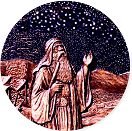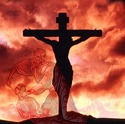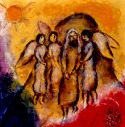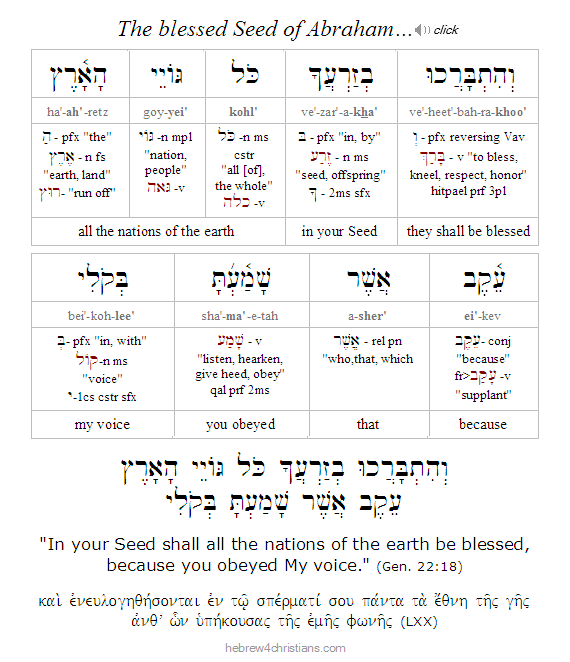|
In the "Gospel in the Garden" we considered the very first prophecy given in the Torah, namely, God's promise that through the "seed of the woman" would come one who would slay the serpent and crush the kingdom of Satan (Gen. 3:15). This prophecy is sometimes called the proto-euangelion ("first gospel"), since it constitutes the starting point of all subsequent redemptive history revealed in the Scriptures. In a sense this promise forms the "womb" for the whole course of God's redemptive plan for the human race. The first prophecy of Torah clearly anticipated the coming of the Savior of mankind and a cosmic battle between good and evil: "... he (i.e., the Savior/Messiah) will crush your head (ראשׁ), and you (i.e., the serpent/Satan) will crush his heel (עָקֵב)."
It is likely that Eve initially believed that her firstborn son Cain (קַיִן) was the promised Seed himself. After all, the miracle of birth surely came as a great shock to her, and Eve's faith in God's promise that through her seed would come the deliverer was doubtlessly upon her heart at this time. When Eve called her son "Cain" (wordplay from the verb kana (קָנָה), "to get"), she was expressing her faith in God's promise: קָנִיתִי אִישׁ אֶת־יהוה / kaniti ish et-Adonai, "I have gotten a man - namely, the LORD" (Gen. 4:1). Eve's faith was obscured by the translators, however, who rendered the Hebrew as "I have gotten a man with the help of the LORD" (i.e., they inserted the idea of "help" and translated the particle et (את) as "with" rather than as the direct object marker for the verb). The ancient Jewish targums, however, agree with the original Hebrew. For example, Targum Yonatan reads: "I have gotten a man - the Angel of YHVH." Surely Eve, the first mother of humanity, was endowed with great wisdom from God, especially after she turned to Him in repentance after her disobedience. The straightforward reading of her words, then, expressed her hope that the LORD Himself would be made a man....
Despite her hope that Cain was none other than the God-Man and promised Deliverer, Eve's hopes were dashed when it became clear that her son was of the seed of Satan (1 John 3:12). His younger brother Abel (הֶבֶל) was a shepherd who evidenced faith in the promise of the coming redeemer by offering blood sacrifice (Gen. 4:3-5). Abel was persecuted and finally murdered by his brother Cain "because his own deeds were evil and his brother's righteous." Their spiritual conflict is indicative of the ongoing warfare between the "sons of darkness" and the "sons of light."
The murder of Abel necessitated that the coming seed would descend through another child, and therefore the Torah describes the birth of Seth (שֵׁת, lit. "appointed"), the third son of Adam and Eve. The Scriptures further state that it was the descendants of Seth who "began to call upon the Name of the LORD" (לִקְרא בְּשֵׁם יהוה), indicating that they had faith in God (אֱלהִים) as the Compassionate Covenant Keeper (יהוה) who would redeem humanity by means of the coming seed. Seth called his firstborn son Enosh ("man"), perhaps in the hope that his child would be the promised Savior (interestingly, bar enosh (בַּר אֱנָשׁ), or "Son of Man," is the name for the Savior (Dan 7:13).
The Torah then traces the genealogy (toldot) of Seth through ten generations (from Adam), until his descendant Noach (נחַ) is described as the only tzaddik (righteous man) remaining in the earth (for more on the genealogy, see parashat Noach). The promise of the coming seed would therefore come through Noah, since his family alone survived the great flood. Now Noah had three sons, but it was through Shem (שֵׁם) that the "line of the Messiah" would come. According to midrash, Noah announced his blessing near the end of his life. When he said, "Blessed be the LORD, the God of Shem" (בָּרוּךְ יהוה אֱלהֵי שֵׁם), he prophesied that the coming redemption would come through the line of Shem, not through Canaan or Japheth. Notice that the phrase, "he shall dwell (יִשְׁכּן) in the tents of Shem," is often thought to refer to Japheth, though the Hebrew grammar is ambiguous. Does the "he" in this case refer to Japheth or to the LORD? A viable translation would be "and He (i.e., the LORD) shall dwell in the tents of Shem," meaning that the LORD would dwell among the Shemites, and by extension, that the promised Seed would come from this line. In this sense, Noah's blessing to Shem was a prophecy of the coming Redeemer through Shem (similar to Jacob's blessing of Judah as the chosen tribe). Since the LORD is the "God of Shem" (יהוה אֱלהֵי שֵׁם), and the prophecy states that one day He (i.e., God) would "dwell in the tents of Shem," the Torah indicates that the coming Redeemer (הַגּוֹאֵל) would come from the Shemites, of whom the great patriarch Abram (אַבְרָם) descended.

The Torah identifies Abram as the tenth generation from Noah (including Noah), and therefore the twentieth from Adam. God called Abram out of Ur of Chaldea to begin a pilgrimage of faith to the land of promise (Heb. 11:8-10). The story of Abram is highly prophetic of the coming Messiah, and the promises given to him foretell of the advent of Yeshua in unmistakable ways. After the Akedah (i.e., the sacrifice of Isaac), God promised that "in your seed (זֶרַע) shall all the nations of the earth be blessed, because you have obeyed my voice" (Gen. 22:18). In light of the New Testament, the faith of Abraham - and especially the faith demonstrated by the Akedah - prefigured the justification of the nations through faith. Therefore we read: "And the Scripture, foreseeing (προοράω) that God would justify the nations by faith, proclaimed the gospel (προευαγγελίζομαι) beforehand to Abraham, saying, "In you shall all the nations be blessed" (Gal. 3:9). It is noteworthy that Abraham received this promise as a Gentile, since he was yet given the commandment of brit milah (circumcision) as a token of Jewish identity. Abraham was therefore uncircumcised when he believed the good news of the coming redemption of mankind (Rom. 4:10-12). Therefore the Apostle calls Abraham the father of faith for those Gentiles who would later believe the good news of redemption in Yeshua. "So then, those who are of faith are blessed along with Abraham, the man of faith" (Gal. 3:9; Rom. 4:16).

Genesis 22:18 clearly states that the blessing would come through Abraham's "seed" (זֶרַע). The Apostle Paul clearly identifies this seed with Yeshua: "Now the promises were made to Abraham and to his offspring. It does not say, "And to offsprings," referring to many, but referring to one, "And to your offspring," who is Messiah" (Gal. 3:16). In other words, the promises were made first to Abraham but also to the coming Messiah. This is yet another example of a "dual aspect" prophecy, since it pertains to Abraham and his chosen offspring (i.e., Isaac (not Ishmael), Jacob (not Esau), Judah (not Reuben), David (not Jesse's firstborn), Solomon (not Adonijah), etc.), but also to the coming Messiah who would redeem fallen humanity from the curse brought about through Satan (John 8:56). Abraham was chosen by God, in other words, to "deliver" the promised Savior to the world. "Salvation is from the Jews," of course (John 4:22), but the blessing of Abraham's promised Seed was ultimately meant to be bestowed upon all people, so that one day the Kingdom of God would be manifest within the sons and daughters of Adam (Gal. 3:14). This is also why Malki-Tzedek, the "priest of the Most High God," was the one who was appointed to bless Abraham, since he prefigured a priesthood that predated the one given later to the Levites through the office of Moses (Heb. 7:1-21).
The original curse of death and the division symbolized by Babel would be reversed through the sacrificial death, burial, and resurrection of Yeshua the Messiah: "And they sang a new song, saying, 'Worthy are you to take the scroll and to open its seals, for you were slain, and by your blood you ransomed people for God from every tribe and language and people and nation, and you have made them a kingdom and priests to our God, and they shall reign on the earth" (Rev. 5:9-10).
Hebrew Lesson
Genesis 22:18 reading (click for audio):
|






